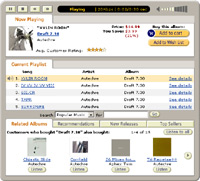The Gizmondo is an interesting new twist on mobile gaming: the hand-held console has an integrated miniature GPS unit, so games will know where you are. Location-based gaming is new, because the technology just hasn’t been economical until now. Game worlds can be tailored to respond to a users location and fantasy worlds can be “overlaid” onto real-world places.
The console’s specifications are remarkably similar to many smart phone/PDAs available now, and it essentially looks like an upside down nGage. It’s essentially a tri-band GPRS phone with a 400MHz ARM processor, 240 x 320 pixel TFT screen, Bluetooth and a camera. What makes the unit exciting from a games perspective is the 3D graphics accelerator, providing proper polygon-based graphics rather than 2D sprites.
Games can be installed via the phone network or through MMC/SD cards. There are currently three titles associated with the console: Colors (an “urban warfare” game), Stunt Car Extreme and Speedgun Stadium (a first person shooter, interestingly single player). A new game, code-named “City” has just been announced, a multiplayer title designed for quick-fix gaming.
The arrival of the Gizmondo shows that manufacturers are starting to take mobile gaming very seriously indeed, no doubt because of the revenue stream potential: networked mobile games consoles mean that networks can charge for access, charge per game and charge per session. They can also sell add-on levels, outfits and even in-game objects and items.
The arrival of the Gizmondo will concern Nokia. From the public’s point of view, the two consoles are virtually undistinguishable, both from a purely visual perspective and from functionality – except the Gizmondo has a GPS unit. The Gizmondo is due for a Autumn launch in the UK, with the rest of the World following shortly. Pricing is estimated to be around UK£250 (€373), but will no doubt be considerably less when sold with an air time contract, as seen with the nGage.
Carrying around a GPS unit also means that network providers’ marketing departments will have fun thinking up new ways to send you location-specific sales messages. All network subscribers at an outdoor festival can be messaged with special offers on CDs, for example. With potential like this, expect GPS units in phones to be a lot more common in phones in future: a drop in price for GPS technologies coupled with better mobile networking and a proven revenue model means location-based entertainment’s time is soon.
 Amazon.com have quietly rolled out a nifty new music preview feature, allowing much more convenient previews than before. The site’s erstwhile preview system was always a bit hit and miss, lacking in some obvious functions, but the new system, comprising of a pop-up box control panel with more than a whiff of iTunes about it is much better and demonstrates that it’s not just the better download sites that allow you to try before you buy.
Amazon.com have quietly rolled out a nifty new music preview feature, allowing much more convenient previews than before. The site’s erstwhile preview system was always a bit hit and miss, lacking in some obvious functions, but the new system, comprising of a pop-up box control panel with more than a whiff of iTunes about it is much better and demonstrates that it’s not just the better download sites that allow you to try before you buy.